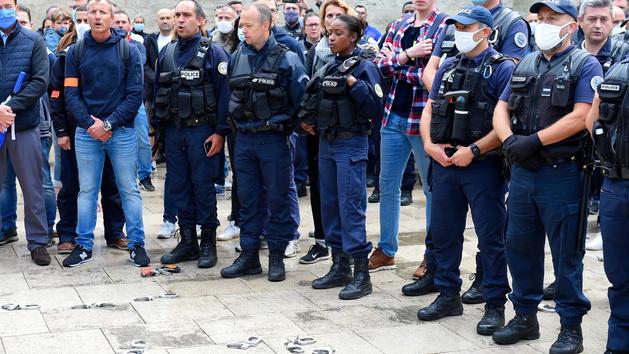The end of the throttling key does not pass to the police. Monday June 8, the Minister of the Interior Christophe Castaner announced to put an end to this technique which allows the police officers and the gendarmes to master reluctant individuals during an arrest. " It is a method that involved dangers, " he said, while the debate on violence committed by the police is in full swing.
Read also: Struck by suspicion, the police feel disarmed
On Thursday 11 and Friday 12 June, the police unions were received at Place Beauvau to express their incomprehension. In front of the press, Fabien Vanhemelryck, from the Alliance National Police union, summarized their grievances. " We told her that the technique of strangulation, she had to stay until we found another because the colleagues needed it and with it, they saved lives and protected lives ", He summed up.
The police refute the argument used by the Minister of the Interior who wants this technique to be dangerous. " Let us be given formal proof of accidents generated by head checks," says Yves Lefebvre of the Union SGP Police union. Today, we don't have any . ”
The choke key, the Tazer and the uppercut
" The key to choking is a head support to bring to the ground, to control the individual without hurting him," we explain to the UNSA-Police union. It is a technique used in martial arts, in judo, in self-defense, it allows us to keep the upper hand on individuals stronger than us ”.
Read also: Sense of betrayal, disgust and weariness in the police ranks
By throttling key, we mean in fact several things. There is strictly speaking two types of keys: "blood", which puts pressure on the carotid artery, and "breathing", which puts pressure on the trachea. But according to Grégory Joron, general secretary of the union SGP-Police union, " most of the time, [the police officers] exercise a simple" rear head control " ", that is to say a grab on the neck of the individual arrested to bring him to the ground, without pressure on the artery, or on the trachea.
But this former CRS recognizes that there may be failures. According to him, they are due to the lack of continuous training. " These gestures are very well mastered when leaving the police academy, but since there is no continuous training, the older police officers can execute them less well ".
"We are not going to electrocute all the people who do not want to be taken in!" "
Grégory Joron, SGP-PoliceTo replace these arresting techniques, the government has declared its intention to generalize the use of the electric pulse pistol (PIE), better known as the Taser. For all the police officers interviewed, this solution not only ignores the realities on the ground, but it also involves far more danger than the throttling keys. " We are not going to electrocute all the people who do not want to be taken in!" exclaims Grégory Joron. The Taser is much more violent than a choke key. " A police commissioner agrees with this. " It's very practical," he explains, " but it's the last resort ."
Furthermore, this weapon seems unsuitable for many situations. "Imagine in a confined space such as a corridor or a stairwell, explains an executive of the UNSA-Police, it would mean shooting at point-blank range ." The Taser is also prohibited in maintaining order, that is to say when the police supervise demonstrations or gatherings. It is therefore impossible to use it in these situations. Finally, the commissioner draws attention to a last problem: " the Taser ignites the tear gas , he explains, it already happened in 2013, Place de la Nation [in Paris]".
Because the Taser is not a solution to allow the police to control the most reluctant people arrested, the police stress the risk of aggravating the arrests. " Without the throttling key, we risk having more cases of beatings by the police, because going to contact is a way to avoid the exchange of blows , we explain to the UNSA -Police. And nobody wants to see the police give uppercuts . ”
" The strangulation is there to challenge someone violent without having to break their nose ," summarizes the police commissioner . It's a professional technique, it's not a fight . It remains the use of force, and unfortunately, it can sometimes hurt . ”
"We must be consulted"
So the unions organized themselves so that the government reversed this decision. Thursday 11, the peacekeepers' unions met Christophe Castaner, the next day, it was the turn of the delegations of officers and commissioners. " We are hopeful that he will change his mind, " said Grégory Joron, who was part of the Thursday delegation.
Read also: Police: between the minister and his troops, a relationship of confidence undermined
Union formations have badly accepted not to have been consulted on a subject which concerns their daily life so closely. “ If there is to be an evolution, we must be consulted, insists Grégory Joron . We asked for the constitution of working groups, and if the government persists, the establishment of test departments, so that we can have feedback . ”
These police deplore a decision taken under the blow of emotion, to please a public opinion shocked by the death of George Floyd in the United States. " People no longer understand the use of force," analyzes the police commissioner. Yet it is necessary for democracy and the police have a monopoly on legitimate violence ”. For him, this questioning is part of an already long-standing crisis of authority, "but the police are the first manifestation of this authority ".

